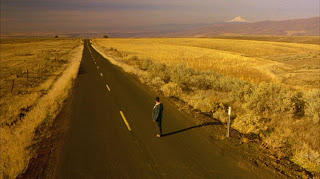Gus Van Sant is one idiosyncratic gentleman. Overtly artistically and untediously belligerent, he sees and creates stories that juxtapose abrupt violence with oblique emotional warmth and sincere humour. Van Sant, who went to school with David Byrne, is a true renaissance man - he directs, writes, paints, plays music, photographs, winks, twerks and nods according to trusty old wikipedia. In that vein My Own Private Idaho, his third directorial accreditation, is a demonstration of his ability to juggle multiple strands and ideas yet still finish with a coherent final picture.
 As an independent film My Own Private Idaho could be pretty free with its controversial content, able to say and paint the visual pictures that a mainstream studio film couldn't, yet it struggled to pick up funding for production. The controversy surrounds the rent boy homelessness of narcoleptic Mike (River Phoenix) and Scott (Keanu Reeves). Perhaps controversy arose because of the film's matter-of-fact treatment male prostitution: the reasons for their lowly predicament are not the subject of the film and are left unexamined because this isn't some social analysis of American society but a story about relationships and existentionalism. Their 'profession' is not a central plot feature, just a kind of mental starting point for the story to progress from. Though most sex scenes are implied there are two that appear out of necessity, and they ingeniously portrayed: instead of movement Van Sant appears to draw from his photographic background and puts his copulating characters in significantly sexual still life positions... sure I've seen it somewhere else, but can't remember where.
As an independent film My Own Private Idaho could be pretty free with its controversial content, able to say and paint the visual pictures that a mainstream studio film couldn't, yet it struggled to pick up funding for production. The controversy surrounds the rent boy homelessness of narcoleptic Mike (River Phoenix) and Scott (Keanu Reeves). Perhaps controversy arose because of the film's matter-of-fact treatment male prostitution: the reasons for their lowly predicament are not the subject of the film and are left unexamined because this isn't some social analysis of American society but a story about relationships and existentionalism. Their 'profession' is not a central plot feature, just a kind of mental starting point for the story to progress from. Though most sex scenes are implied there are two that appear out of necessity, and they ingeniously portrayed: instead of movement Van Sant appears to draw from his photographic background and puts his copulating characters in significantly sexual still life positions... sure I've seen it somewhere else, but can't remember where.The writing is fragile and delicate and oscillates wildly between the two central characters; it can be separated into four distinctive acts. One, the lives of the boys specifically Mike and his stressful narcolepsy (often sleeping through difficult or socially awkward scenarios); two, with the arrival of Bob Pigeon (William Richert) as the Falstaff figure My Own Private Idaho transforms into a contemporary homage to Shakespeare's Henry IV: Part One, with Scott (who comes from a rich background) as Prince Hal, the character who indulges in moral depravity but whom plans a spectacular redemption to emphasis his dramatic transformation - it also re-enacts one of the more famous scenes from that play, the robbery - with Scott taking the central lead role; the third act features both Mike and Scott equally as the movie becomes a self-discovery travel drama, an attempt to find Mike's mother a trail that leads them to Italy and back (to Portland); finally, we see Scott's redemption and Mike's further descent into depression and psychosis.
That was a long and perhaps confusing sentence (147 words). Mike ends up in his place of existential wilderness (from which the movie opens up with as well) talking to himself; he has lived and is living a difficult under-privileged life full of knock-downs and bad luck. Upon falling into another narcoleptic stupor he is robbed of his belongings and shoes; but then a figure comes along and picks him up: is it another horny customer in search of purchased debauchery? Or is it Scott retrieving his best friend from the metaphorical ditch?
I - as are many others - am slightly in love with Phoenix. Like other figures who die before their time - Keats, Duncan Edwards - or at the peak of their powers - Cobain, Hendrix, Morrison - there's a romance about the premature death of great individuals. River Phoenix sits alongside those individuals because he was/is a great actor blessed with an extraordinarily nuanced talent - the campsite scene is a fine example of that. He had the delicacy and touch of a master. My Own Private Idaho is arguably his greatest film and so we, the retrospective audience who know how shortly his life would continue, have learnt to appreciate it even more.
My Own Private Idaho is aided by the presence of Phoenix who has left a ghostly cult-like impression on all of the films he worked on in his short-lived career. Nonetheless it remains a genius indie movie full of surreal metaphorical images and Udo Kier in his customary American role as 'strange European'.
No comments:
Post a Comment